- Home
- Mari Mancusi
Scorched s-1
Scorched s-1 Read online
Scorched
( Scorched - 1 )
Mari Mancusi
Trinity
Don’t leave me here... It starts with a whisper. At first Trinity thinks she’s going crazy. It wouldn’t be a big surprise—her grandpa firmly believes there’s a genuine dragon egg in their dusty little West Texas town. But this voice is real, and it’s begging for her protection. Even if no one else can hear it...
Connor
He’s come from a future scorched by dragonfire. His mission: Find the girl. Destroy the egg. Save the world.
Caleb
He’s everything his twin brother Connor hates: cocky, undisciplined, and obsessed with saving dragons.
Trinity has no idea which brother to believe. All she has to go by is the voice in her head—a dragon that won’t be tamed.
Scorched
by
Mari Mancusi
To my parents, who instilled a love of fantasy and imagination at an early age by reading me the Narnia series, Lord of the Rings, and countless Choose Your Own Adventure novels. I promise to pay it forward with Avalon someday.
They came at noon, black shadows dancing across the sky, drowning out the sun. Their cries echoed through chambers and courtyards. Their fire blazed down narrow streets.
Some dropped to their knees in prayer. Others tried to flee. But in the end, they all fell down—ashes choking their lungs, flames singeing their flesh.
There was no place to run. No place to hide.
They would find you.
And when they did…you would surely burn.
—The Scorch, by Julian Bachman, year 54 PS
PART 1:
ICE
Chapter One
SCREECH!
Connor’s eyes flew open. Blinding white lights barreled toward him at breakneck speed. No time to think, he hurled himself to the side, adrenaline igniting the reflexes he’d honed in boot camp. A bright blue metal monstrosity shot past him, wailing an angry protest in its wake.
That was close. Too close. Sucking in a breath, he crawled up onto a nearby platform, trying to gain his bearings. Shiny hunks of metal machinery—like the one that had nearly crushed him—lined the road, dark and silent, while others cruised by, determined white lights chasing brilliant red tails. They reminded him of something he’d once seen on the Surface Lands. Cars, his father had called them. Of course they looked a lot different when living, breathing, and not caked with rust.
But that meant…A smile crept to his lips.
It had worked. It had actually worked.
“Well, what do you know,” he murmured, drawing in a lungful of the freshest air he’d ever breathed in all his seventeen years, with zero smoky aftertaste. It was crisp. Colder than they’d predicted for August in Texas. So cold, in fact, he could see his breath reflected in puffy clouds as he exhaled. Shivering a little—his travel jumper was definitely not made for this kind of weather—he found himself gazing up into an open sky littered with stars and anchored by a bright, full moon. The vastness of the universe unabashedly spread out before him made him a little dizzy.
Maybe I should make a wish, he considered, remembering the old rhyme his mother used to sing. Star light, star bright…
Wish my supplies would arrive all right, the soldier in him finished, reminding him he wasn’t on some pleasant stargazing holiday. His eyes reluctantly left the sky, scanning the ground below, searching for his canister. One couldn’t travel with one’s belongings, they’d told him in the debriefing, except for specially designed clothing. Something about splitting up different types of molecules. The essential items they’d sent to aid his mission would be arriving separately. In a titanium pod. Right about—
A large metal cylinder shot through the sky, almost knocking him out before bouncing harmlessly to the ground.
—now.
“What in God’s good name was that?”
Connor whirled around to find the largest woman he’d ever seen exiting one of the nearby apartment buildings. He tried not to gape at her immense frame, wrapped securely in a black, puffy coat. What rations must these people be allotted in order to gain such girth? As three equally well-fed and well-dressed young boys filed out behind her, his mind flashed to the orphans of Strata-D. Their rail-thin frames, their hollow, hungry eyes…
He set his jaw. Just another reminder of how important this mission truly was.
As he watched, the three boys scrambled past their mother, eagerly circling the titanium capsule, eyes shining with interest. One reached down, daring to touch it…
Connor swept in, neatly scooping up his belongings. As the children squawked in protest, he held up his free hand. “It’s okay,” he tried to assure them. “It’s just my—”
“Get away from my kids, you freak!” Mom was now on the scene, waving one hand threateningly at Connor, the other fumbling at her coat pocket. For a split second, he feared she was reaching for a weapon. Instead, she pulled out a small, black plastic device. Some kind of primitive transcriber?
“See something, say something,” she muttered to her children, waving them behind her, as she frantically started pressing at the screen. “That’s what they say to do. Can’t let the terrorists win.”
“Please,” Connor pleaded, taking a few steps backward, his mind desperately searching for a rational explanation for the canister falling from the sky. Preferably one that didn’t require prior knowledge of quantum physics. He was supposed to be blending in, not making a scene. He wasn’t exactly off to an auspicious start.
His eyes lit upon an open window, two stories up, red-checkered curtains fluttering in the night sky. “My…girlfriend,” he stammered, his mind reaching for the proper terminology as he waved his arm in the direction of the window. “She tossed me out.” He gave the woman his best sheepish smile, then held up the canister. “Told me to take my gear and never come back.” The woman narrowed her eyes, staring at him for a moment, then up at the open window. Connor realized belatedly that she could very well know the girl who lived in the apartment above or know that there was no girl to begin with. This wasn’t like back home; people here knew their neighbors, shared cups of sugar—that sort of thing. Had he just made a huge mistake?
Believe me, he pushed, in a feeble attempt to try to bend her will. Believe me and walk away.
But it was no use. The trip had left him completely depleted. And he had no idea how long it would take to regenerate his spark. He’d be forced to do things the old-fashioned way—at least for the foreseeable future.
“What’s her name?”
Connor startled. “What?”
“Her name,” the woman repeated. “Your girlfriend who threw you out. Does she have a name?” She gave him a pointed stare, as if daring him to answer, her fingers still hovering dangerously close to her transcriber.
“Oh right. Her name is…”
His mind went blank. Completely blank. Come on, Connor. A name! Any name! He could feel her eyes upon him, sharp, assessing, as they took in his strange clothes with growing suspicion. He had to do something—say something—and fast. Before it was too late. “Her name is…”
With one fluid movement, he ripped open the capsule, his fingers diving for his gun. Before the woman could even grasp his intentions, he had the weapon trained on her face. “Her name is get the hell back!” he growled. “And I suggest you do as she says.”
The woman’s eyes bulged and a small squeak escaped her lips. Staggering back, she held up her hands in surrender, her transcriber falling from her meaty grasp and clattering to the pavement below. Her children screamed, latching on to their mother, their innocent little faces mirroring her terror as Connor narrowed his eyes, doing his best to look desperate and dangerous. As if he were the type of guy wh
o shot down mothers and children in cold blood every day before breakfast.
“Please, mister,” the woman begged, fat tears streaming down her cheeks. “You can have everything. Just let us go.” She shrugged her bag off her shoulder, allowing it to fall to the ground. “There’s plenty of cash in there. Take it all. Just don’t hurt my kids.”
Connor sighed, lowering his gun. And…so much for blending in.
“It’s okay,” he tried to assure her, guilt gnawing at his insides. He’d meant to stop her from making her call, not scare her and her family half to death. “I promise I’m not going to hurt you.”
I’m the good guy, he wanted to add. The one they sent to save your world.
But of course he couldn’t tell her that. It would just bring up too many unanswerable questions. And he had to get a move on anyway—catalog his gear, get changed, locate the museum. Do a little preliminary scouting before introducing himself to the girl. He had a lot to accomplish in the next four months—before the Reckoning day—and, as his father would say, there was no time like the present.
Or the past, in this particular case.
He gestured to the woman’s bag with an apologetic look. “Take your stuff. Just walk away and pretend you never saw me, okay?”
Yeah, like that was going to happen. He could tell from the look in her eyes she’d remember this incident till her dying day. Her children too. But it couldn’t be helped, he reminded himself. And they would thank him if they knew the truth. They would get down on their very knees.
The woman’s face crumpled in relief. “Thank you, sir!” she babbled. “Thank you, thank you so much.” She scurried to grab her bag, then collected her cracked transcriber. “Merry Christmas,” she babbled as she gathered up her children and turned to leave. “Merry Christmas to you and yours.”
Connor had started to walk away. But the woman’s words made him pause. “Wait, what? What did you just say?” He turned back to her questioningly.
The woman whimpered, holding her hands in front of her face, as if she was afraid he was going to hit her. “Um, I just said merry Christmas,” she stammered. “Or, you know, whatever holiday you celebrate—Happy Hanukkah? Kwanza?”
“But…” Connor protested, his mind racing with sudden confusion. “It’s August.”
The woman stared at him, as if he’d lost his mind.
“It has to be August,” he repeated, panic welling up inside of him. “They told me it would be August. Four months before the Reckoning.”
“Um, I don’t know what that is,” the woman sputtered. “But it is Christmas. I promise you, it’s Christmas Eve. In fact, I was just about to take the boys over to see the tree. They’ve never seen it lit up and—”
She kept babbling, but Connor was no longer listening. He dug into the capsule again, heart pounding wildly in his chest as he searched for his transcriber. There had to be some mistake. The woman had to be lying. Because there was no way…
His hands closed around the device and he pulled it from the pod with shaking fingers. He flicked it on, waiting anxiously for the screen to illuminate, scarcely able to breathe.
December 24th, the device read. 7 p.m.
“No,” he whispered in horror. “That can’t be right.”
But it was, he realized. The signs had been there from the start. August in Texas—it should have been a hundred degrees out—not cold enough to snow.
Something must have gone wrong back at the base. Someone must have pressed the wrong button, turned the wrong dial.
“I was supposed to have four months!” he cried, looking up at the woman with wild eyes. She gave him a helpless shrug, then turned and fled down the street as fast as her thick legs could carry her, her kids scrambling to catch up. Connor watched them go, suddenly feeling as frightened as they must feel. But for a very different reason.
“I was promised four months,” he whispered to no one.
With four months, he could have secured a strong link with the girl. He could have made sure the egg never fell into her hands. He could have gotten a jump on the government…
…and saved his father’s life.
Now he had exactly fifteen minutes. Fifteen minutes to find the museum. Fifteen minutes to retrieve the egg and the girl. Fifteen minutes to figure out a way to make this all turn out right.
Or the apocalypse that ripped apart his world would begin…all over again.
Chapter Two
If I get one more snot-nosed kid asking me if the T. rex used to dine on people, I’m going to close up the museum and become a history teacher. I mean, really! What are they teaching kids in schools these days?”
Sixteen-year-old Trinity Foxx looked up from her laptop in time to see her grandpa come barreling into the museum’s main office, rounding the corner too quickly and slamming into a table of fish fossils by the door. She winced as he scrambled to stop a four-hundred-million-year-old cephalopod from crashing to the floor.
“Hey! Watch the ancient artifacts,” she protested, logging out of the museum’s Facebook page and rising to her feet. “Some of them are even older than you are. And almost as brittle.”
“Thanks.” Grandpa shot her a smirk as he limped over to his desk, rubbing his knee. “Your concern is truly heartwarming, as always.”
She snorted. “Why are you giving tours anyway? What happened to Gene?”
Grandpa dumped a stack of mail onto his desk, then nearly knocked it off as he shrugged out of his suit jacket. Trinity had to dive to save it from landing in a nearby trashcan, which may or may not have been her grandfather’s intention in the first place.
“Quit right after his last paycheck bounced,” he muttered. “But really, it’s for the best. The idiot couldn’t even keep his Triassic and Jurassic time periods straight. How could he be expected to educate and inspire America’s youth?”
“Right.” Trinity sighed as she walked back over to her desk, ripping open the red-marked “Urgent” envelope at the top of the stack. This one was from the electric company, who’d been threatening to shut off power to the museum for the last three months. She didn’t know why companies bothered wasting paper on fourth and fifth notices. Just because they couldn’t afford to pay the first one didn’t mean they needed a new copy. “Well, I hope you charged the group full price, at least.”
Grandpa walked around to sit behind his desk, avoiding her eyes. “They were from a poor district in Stocktown. Mostly migrant farmer kids and illegals.”
“Of course they were.” Her grandpa’s kind heart was one of his best qualities—but it was also going to be the death of them. “And what about that history museum in Kentucky?” she asked. “The one you loaned the Ornithischian dinosaur exhibit to six months ago?” She flipped through the stack of envelopes, praying for something that resembled a check.
Grandpa waved her off. “Next week. They promised to pay me next week.”
Trinity gave up, plopping the stack of bills onto her desk. It was always next week, next month, next year. Except what Grandpa couldn’t seem to grasp was there wouldn’t be a next week, month, or year if they didn’t start finding a way to pay the bills.
Back in the day, Foxx’s Fantastical Fossils had been a famous West Texas attraction, luring tourists off the highway with exhibits that promised to rival all but the most top-tier institutions. Her grandfather’s collection of dinosaur bones from the Jurassic period alone was well worth the trip off the interstate.
But five years ago the main highway had been rerouted and traffic thinned to a crawl, the roadside attraction now too far a detour for all but the most determined of tourists. And though the money stopped flowing, the bills kept piling up, and much of the collection had to be sold off or loaned to wealthier museums just to keep the lights on and the doors open.
To make matters worse, her grandpa had started replacing some of his former exhibits with what some might call…questionable stand-ins, hoping to draw back the crowds. From a mangy Chupacabra corpse to a rack of jac
kalope horns, Trinity knew it was not for nothing the townspeople had started whispering about “Crazy Old Foxx’s Fossilized Freak Show.” It was only a matter of time, she knew, before they’d be shuttered for good.
And where would that leave her?
“Grandpa…” she started to plead, then closed her mouth. What good would it do? Her guardian, much as she adored him, was the quintessential nutty professor—too wrapped up in his own spectacular inner world to comprehend even the most basic of money matters.
Which left it all up to her.
Since she’d moved in after her mother’s death, she’d done what she could, from taking over the museum’s publicity and custodial duties after school so they could cut back on staff, to cleaning houses and mucking out barns on weekends to earn extra cash. But try as she might, it never seemed like enough. And her carefully constructed world was feeling more and more like a house of cards each day. Every time the phone rang or someone knocked on their door, she’d freeze in panic—convinced it was social services, come to take her away. Her caseworkers had never been truly convinced that her grandpa was capable of taking on the responsibility of an orphaned teenage girl. And they’d be more than happy for an excuse to throw her back into foster care.
But Trin was not going back. Not now that she finally found a family to call her own. And whether that meant hiding their financial situation from neighbors and teachers or begging debt collectors for “just one more extension,” she did what she had to do to keep the two of them together. Last week she’d even pawned her mother’s emerald ring to pay their overdue property taxes.
She involuntarily glanced down at her finger, still sporting a tan line from where the ring had been—before she’d been forced to hand it over to the shady-looking man behind the bulletproof glass. It had been the only treasure she’d been allowed to keep after her mother’s death and her finger felt naked without it.

 Smoked
Smoked Golden Girl
Golden Girl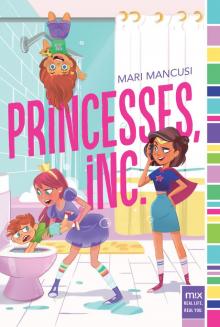 Princesses, Inc.
Princesses, Inc. Night School
Night School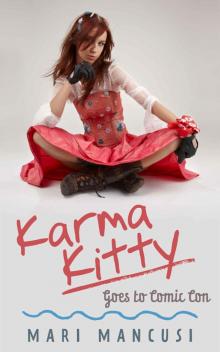 Karma Kitty Goes to Comic Con
Karma Kitty Goes to Comic Con Blood Forever
Blood Forever Alternity
Alternity Blood Ties
Blood Ties Bad Blood
Bad Blood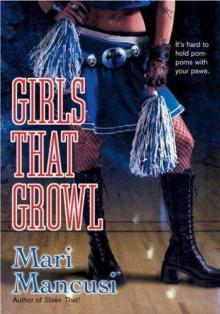 Girls That Growl
Girls That Growl Moongazer
Moongazer Shattered
Shattered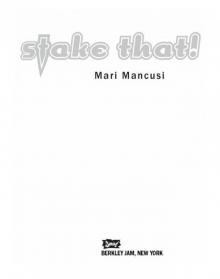 Stake That
Stake That Sk8er Boy
Sk8er Boy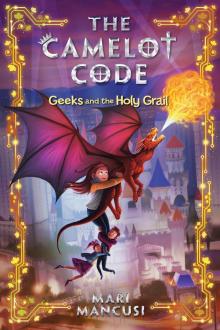 Geeks and the Holy Grail
Geeks and the Holy Grail Boys That Bite
Boys That Bite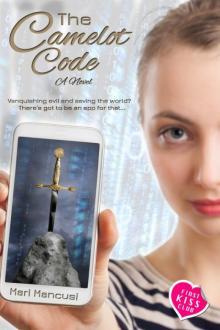 The Once and Future Geek
The Once and Future Geek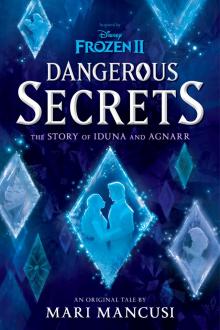 Dangerous Secrets
Dangerous Secrets Scorched
Scorched A Hoboken Hipster in Sherwood Forest
A Hoboken Hipster in Sherwood Forest Soul Bound
Soul Bound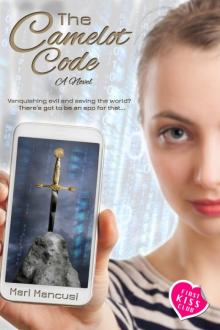 The Camelot Code
The Camelot Code Scorched s-1
Scorched s-1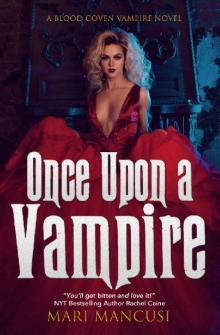 Once Upon a Vampire: Tales from the Blood Coven Book 1
Once Upon a Vampire: Tales from the Blood Coven Book 1 06 Blood Ties
06 Blood Ties